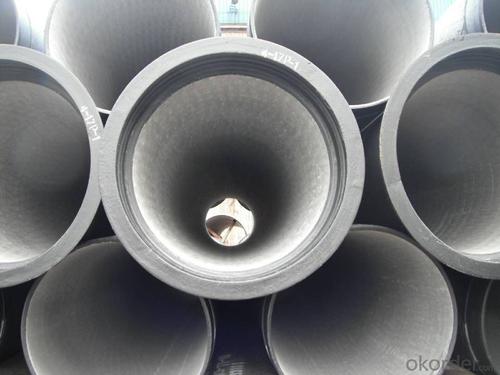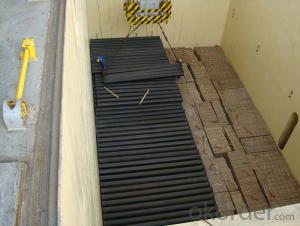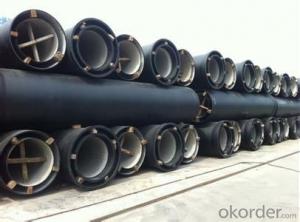DUCTILE IRON PIPE DN200 K9
- Loading Port:
- China Main Port
- Payment Terms:
- TT OR LC
- Min Order Qty:
- -
- Supply Capability:
- -
OKorder Service Pledge
OKorder Financial Service
You Might Also Like
Specification:
1) The standard of pipe: ISO2531:1998, K9
2) Effective length: 6m
3) Inner cement line: Portland cement line as per ISO4179
4) Zinc coating: at least 130g/m2 as per ISO8179
5) Bitumen painting: at least 70um as per ISO8179
6) With 100% quantity of NBR ring, or SBR ring, or EPDM ring as per ISO4633
7) DN80mm-800mm
8) High strength, lighter than grey iron, good corrosion resistance, no furring, small flow resistance, easy fixing, long life tome about 100 yeas
9) Produced by Hangzhou chunfeng machine
10) Checked by automatic inspection equipment
11) Composition:
Chemical composition | |||
Chemical composition | Ductile Cast Iron Pipe (%) | Grey iron pipe (%) | Steel pipe (%) |
C | 3.5-4.0 | 3.2-3.8 | 0.1-0.2 |
Si | 1.9-2.6 | 1.4-2.2 | 0.15-0.4 |
Mn | 0.15-0.45 | 0.4-0.6 | 0.3-0.6 |
P | ≤0.06 | ≤0.3 | 0.02-0.03 |
S | ≤0.02 | ≤0.1 | 0.02-0.03 |
Mg | 0.03-0.06 |
|
|
12) Feature:
Mechanical properties | |||
| Ductile Cast Iron Pipe | Grey Iron Pipe | Steel Pipe |
Tensile Strength(Mpa) | ≥420 | 150-260 | ≥400 |
Yield Strength(Mpa) | ≥300 | No Confirmation | No Confirmation |
Bending Strength(Mpa) | ≥590 | 200-360 | ≥400 |
Elongation (%) | ≥10 | Neglected | ≥18 |
Brinell Hardness(HBS) | ≤230 | ≤230 | About 140 |
13) T type mechanical joint
14) Packing: in bulk or container
- Q: Ductile cast iron can replace copper sleeve
- Under dry friction conditions, we design a pre - formed synovial membrane on the surface of the bearing to ensure that the solid lubricant is transferred to the dual parts in the shortest possible time, and an effective solid lubricant film is formed
- Q: Are ductile iron pipes suitable for use in geothermal applications?
- Yes, ductile iron pipes are suitable for use in geothermal applications. They possess excellent strength and corrosion resistance, making them resistant to the high temperatures and corrosive nature of geothermal fluids. Additionally, their ductility allows them to withstand the expansion and contraction associated with geothermal systems, making them a reliable choice for such applications.
- Q: Can ductile iron pipes be used for water supply in remote areas?
- Yes, ductile iron pipes can be used for water supply in remote areas. Ductile iron pipes are known for their strength and durability, making them suitable for various applications, including water supply systems. Their resistance to corrosion and ability to withstand high pressure make them a reliable choice for transporting water even in remote areas where maintenance and accessibility may be challenging.
- Q: The difference between cast iron pipe and ductile iron pipe
- Cast iron pipes, also known as pig iron pipes, ordinary gray iron. Often used in socket connection, the sealing material is usually cement rigid interface.
- Q: Can ductile iron pipes be used in areas with high levels of hydrogen sulfide gas and corrosion potential?
- Ductile iron pipes can be used in areas with high levels of hydrogen sulfide gas and corrosion potential, but it is important to consider certain factors before making a decision. Ductile iron pipes have a high resistance to corrosion, especially when they are properly protected with external coatings and linings. This makes them suitable for environments with moderate levels of hydrogen sulfide gas and corrosion potential. However, in areas with extremely high levels of hydrogen sulfide gas and severe corrosion potential, other materials like corrosion-resistant alloys or specially coated pipes may be more appropriate. It is crucial to conduct a thorough evaluation of the specific conditions in the area to determine the suitability of ductile iron pipes. Factors such as the concentration of hydrogen sulfide gas, the presence of other corrosive elements or chemicals, and the overall corrosiveness of the environment should be considered. Additionally, the local regulations and industry standards must be consulted to ensure compliance and safety. In conclusion, while ductile iron pipes can withstand moderate levels of hydrogen sulfide gas and corrosion potential, a comprehensive assessment of the specific conditions is necessary to determine their suitability. Consulting with experts in the field and considering alternative materials may be required in areas with high levels of hydrogen sulfide gas and severe corrosion potential.
- Q: What is the expected cyclic fatigue life of ductile iron pipes?
- Various factors such as material composition, pipe design, loading conditions, and environmental factors can affect the expected cyclic fatigue life of ductile iron pipes. However, ductile iron pipes are widely recognized for their exceptional ability to withstand fatigue. Ductile iron pipes are specifically engineered to endure cyclic loading, which is common in water distribution and sewer systems due to fluctuating pressures and vibrations. These pipes possess a unique microstructure that confers high strength and ductility, enabling them to resist crack formation and growth under cyclic loading. Numerous studies and industry standards have provided estimates for the expected cyclic fatigue life of ductile iron pipes. For instance, the American Water Works Association (AWWA) C151 standard recommends a design life of 100 years for ductile iron pipes used in water distribution systems, underscoring their long-term durability and resistance to fatigue. Furthermore, research studies have demonstrated that ductile iron pipes can withstand over 1 million cycles of loading without exhibiting any signs of fatigue failure. The fatigue strength of ductile iron pipes can be further augmented by employing protective coatings or linings to reduce the impact of corrosion and abrasion. Nevertheless, it is important to recognize that various factors, such as manufacturing quality, installation practices, and maintenance procedures, can influence the expected cyclic fatigue life of ductile iron pipes. Regular inspections, appropriate handling, and adherence to recommended installation guidelines can help ensure the longevity and performance of ductile iron pipes. In conclusion, while the expected cyclic fatigue life of ductile iron pipes can be subject to variation due to several factors, these pipes are generally renowned for their outstanding fatigue resistance and offer a dependable and enduring solution for water distribution and sewer systems.
- Q: Can ductile iron pipe be used for wastewater treatment plant applications?
- Yes, ductile iron pipe can be used for wastewater treatment plant applications. It is known for its durability, corrosion resistance, and ability to withstand high-pressure environments, making it suitable for transporting wastewater in such facilities.
- Q: How does ductile iron pipe perform in areas with high groundwater salinity?
- Due to its inherent resistance to corrosion, ductile iron pipe is highly effective in areas with high groundwater salinity. The presence of elevated levels of salt and minerals in the groundwater can lead to the corrosion and deterioration of certain materials, but ductile iron is highly resilient to this type of corrosion. Its composition and manufacturing process make it less susceptible to damage from corrosive elements found in high salinity water. The primary reason for the corrosion resistance of ductile iron pipe lies in its protective iron oxide coating, which naturally forms on both the interior and exterior surfaces of the pipe. This coating acts as a barrier, preventing direct contact between the pipe and the corrosive elements present in the groundwater. Additionally, ductile iron pipes are often lined with cement mortar or a protective epoxy coating, further enhancing their resistance to corrosion and providing an extra layer of protection. Moreover, ductile iron pipe boasts an extended lifespan, often surpassing 100 years, making it an ideal choice for areas with high groundwater salinity. Its durability and resistance to corrosion ensure that it can withstand the harsh conditions associated with high salinity environments, minimizing the frequency of repairs or replacements. In conclusion, ductile iron pipe is an exceptional option for areas with high groundwater salinity due to its corrosion resistance properties. Its protective iron oxide coating, along with optional linings, offers a dependable and long-lasting solution, guaranteeing the integrity and performance of the pipe system even in demanding environments.
- Q: Does the cast iron have size 250? What's the performance?
- You should be the casting grade or material, if it is ductile iron, said generally between QT400-15 or QT700-2 different indicators, said in front of the tensile strength, the elongation rate refers to the back, China is now the lowest grade of nodular cast iron material is QT400-15, such as QT250.In addition, the number 250 you refer to may also be a code name for ductile iron parts, such as 200, 300, etc., which are manufactured by the factory as required by the project.Gray iron, which has a 250 brand, is generally referred to as HT250, but it is not ductile iron.The machine on the ductile iron and gray iron are used, but generally not made of grey cast iron gear
- Q: How are ductile iron pipes protected from external damage?
- Ductile iron pipes are protected from external damage through the application of protective coatings. These coatings act as a barrier, shielding the pipes from corrosion and other forms of external damage. Additionally, the pipes may be encased in concrete or installed in a casing pipe to provide further protection against external forces and impacts.
Send your message to us
DUCTILE IRON PIPE DN200 K9
- Loading Port:
- China Main Port
- Payment Terms:
- TT OR LC
- Min Order Qty:
- -
- Supply Capability:
- -
OKorder Service Pledge
OKorder Financial Service
Similar products
Hot products
Hot Searches
Related keywords



























